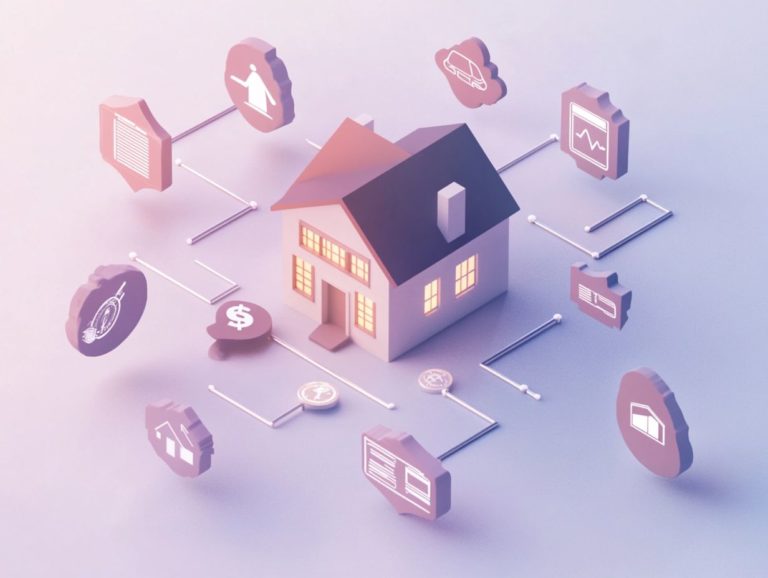How to Avoid Buyer’s Remorse?
You know that sinking feeling that creeps in right after a purchase? It s that nagging doubt whispering, Did I just make a mistake? This phenomenon, often referred to as buyer’s remorse, can hit you whether you ve indulged in a minor splurge or made a significant investment.
In this article, you ll dive into what buyer’s remorse really is, uncover its underlying causes, and spot the signs that it might be affecting you. You ll also discover practical tips for making confident purchases, effective strategies for dealing with regret, and insightful ways to learn from your past decisions to sidestep this all-too-common pitfall in the future.
Let’s take control of your buying decisions today!
Contents
Key Takeaways:

- Understand the definition and causes of buyer’s remorse to better prevent it.
- Recognize signs of buyer’s remorse, such as negative emotions, to address them before they escalate.
- Use tips like researching, setting a budget, and avoiding spur-of-the-moment purchases to make confident choices and avoid buyer’s remorse.
Understanding Buyer’s Remorse
Understanding buyer’s remorse is essential in today s consumer landscape. It captures the feelings of regret and anxiety that often arise after impulsive purchases.
This concept significantly influences both consumer behavior and marketing strategies, highlighting the emotional disconnect many shoppers experience once the excitement of a purchase fades. A recent 2023 study reveals that buyer’s remorse can take various forms, impacting buyer satisfaction and potentially leading to financial missteps. This reflects wider social trends in consumer behavior and financial awareness as customers navigate the repercussions of their spending habits.
Definition and Causes
Buyer’s remorse, the nagging regret that often follows a shopping spree, can arise from various factors, including spur-of-the-moment purchases and peer pressure.
You might find this emotional turmoil creeping in when you make spontaneous decisions without fully weighing the consequences. The tempting lure of instant gratification, coupled with social influences like friends or trending topics on social media, can lead to hasty purchases that don t quite align with your values or financial reality.
Psychological factors, such as the fear of missing out (FOMO, or the worry that others are having more fun) or the desire to impress others, play a significant role in amplifying this regret. However, when you take the time to plan your purchases considering your personal needs and budget constraints you often find that these feelings dissipate. This thoughtful approach allows you to truly savor your acquisitions without the shadow of regret hanging over you.
Signs of Buyer’s Remorse
Recognizing the signs of buyer’s remorse is crucial as you deal with the complexities of shopping. These signs often reveal themselves through negative emotions and an overwhelming sense of dissatisfaction following a purchase.
Identifying Negative Emotions

Identifying the negative emotions tied to buyer’s remorse means recognizing feelings like guilt, anxiety, and disappointment that can creep in after a purchase. These emotions often arise from a disconnect with the product itself, where you might feel a mismatch between your expectations and the actual experience.
Anxiety can bubble up when you think about your financial investments, prompting worries about spending too much on items that don t quite live up to their promises. As you reflect on your decision-making process, it s natural to question whether you made the right choice, which only heightens those feelings of regret.
Understanding these emotions within the realm of consumer behavior is crucial. It enables you to evaluate your buying motivations and fosters a more mindful approach to your future purchases.
Preventing Buyer’s Remorse
Preventing buyer’s remorse is crucial for creating a positive shopping experience. You can use several strategies to make informed purchasing decisions, ultimately enhancing your satisfaction as a buyer.
Act now to transform your shopping experience and avoid regret!
Tips for Making Confident Purchases
To make confident purchases, consider several key factors, including understanding your finances, return processes, and how much each use of an item costs.
Taking the time to assess product testimonials and ratings allows you to glean valuable insights from previous buyers’ experiences. This serves as a reliable guide in your decision-making journey.
It s also essential to familiarize yourself with the return policies offered by retailers. A flexible return process can significantly ease any anxieties tied to your buying decisions.
Understanding the cost-per-wear calculation justifies the price tag and fosters more mindful spending. When you view your purchases as investments rather than mere transactions, you re more likely to make choices that align with your financial goals and lifestyle needs.
Dealing with Buyer’s Remorse
Feeling buyer’s remorse? Here are some powerful strategies to help you move past it!
Navigating buyer’s remorse requires effective strategies that enable you to address your emotional state and transcend the regret tied to impulsive purchases.
By implementing these approaches, you can foster a healthier relationship with your choices and cultivate a sense of peace moving forward.
Strategies for Coping and Moving On

Effective coping strategies for buyer’s remorse involve grasping the nuances of buyer’s remorse law and evaluating the financial missteps that often accompany impulsive purchases.
By reflecting on the emotional triggers that led to your purchase, you can gain clarity and lessen those nagging feelings of regret.
One effective approach is to create a pros and cons list for the item in question. This helps you make better decisions.
Also, knowing your consumer rights and legal protections can offer reassurance, reminding you that there are avenues for recourse if you feel wronged.
Financial education is vital in cultivating healthier spending habits. Investing time in budgeting lessons and long-term financial planning enables you to make informed choices, ultimately reducing the chances of experiencing buyer’s remorse in the future.
Avoiding Buyer’s Remorse in the Future
To avoid buyer’s remorse in the future, commit to learning from your past experiences.
By making informed purchasing decisions, prioritize understanding your finances and ensure that your choices align with your long-term goals.
Learning from Past Experiences
Learning from past experiences with buyer’s remorse can transform your shopping habits, guiding you toward more responsible practices and informed decisions in the future.
This becomes crucial as you navigate a marketplace brimming with enticing products and clever marketing strategies that tempt you into impulse buys.
By reflecting on previous purchases that fell short of expectations, develop a keen eye for quality and necessity, effectively sidestepping similar regrets.
This awareness encourages you to engage more deeply with product features and benefits, steering you toward purchases that genuinely align with your needs.
As a result, this newfound mindfulness not only brings satisfaction but also enables you to make conscious and sustainable choices.
Frequently Asked Questions
What is buyer’s remorse?

Buyer’s remorse is the feeling of regret or guilt that a person experiences after making a purchase, typically due to realizing that the item or service may not have been worth the cost.
How can I avoid buyer’s remorse?
To avoid buyer’s remorse, research the item thoroughly before making a purchase. This includes reading reviews, comparing prices, and considering alternatives, especially when it comes to how to avoid home buying regrets.
Should I make impulsive purchases?
No, making impulsive purchases is one of the main causes of buyer’s remorse. It s important to think about whether the item or service is truly necessary before making a purchase.
What are some other ways to avoid buyer s remorse?
Set a budget and stick to it. This simple step helps prevent overspending and avoids regret later on.
Think about the long-term value of the item or service. This can also help you make better purchasing decisions.
Is it okay to return a purchase if I experience buyer s remorse?
Yes, most stores allow returns and exchanges within a set time frame. If you’re feeling regret, check the return policy and consider returning the item.
How can I make sure I am making a wise purchase?
To ensure a wise purchase, evaluate the cost, quality, and necessity of the item or service. Consulting friends or family for their opinions can also be very helpful.






